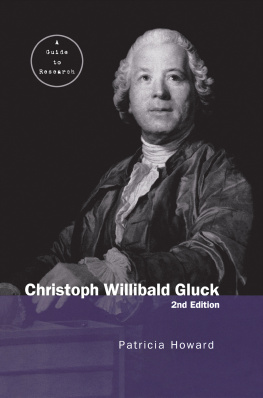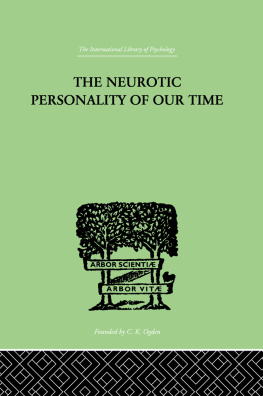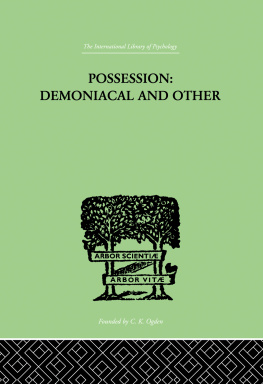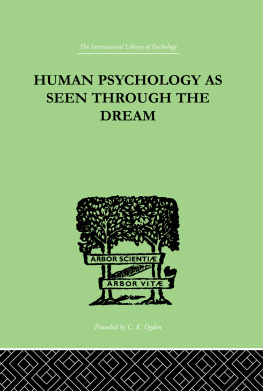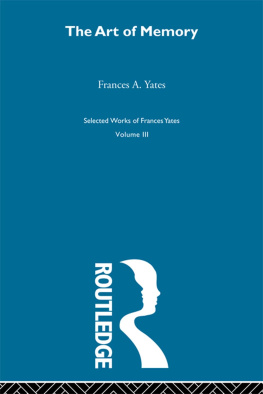Garland Studies on The Elderly in America
edited by
STUART BRUCHEY
ALLAN NEVINS PROFESSOR EMERITUS
COLUMBIA UNIVERSITY
Family Crimes Against the Elderly
ELDER ABUSE AND THE CRIMINAL JUSTICE SYSTEM
Patricia J. Brownell
First published 1998 by Garland Publishing, Inc.
This edition published 2013
by Routledge
711 Third Avenue, New York, NY 10017
2 Park Square, Milton Park, Abingdon, Oxon OX14 4RN
Routledge is an imprint of the Taylor & Francis Group, an informa business
Copyright 1998 Patricia J. Brownell
All rights reserved
Library of Congress Cataloging-in-Publication Data
Brownell, Patricia J., 1943
Family crimes against the elderly: elder abuse and the criminal justice system / Patricia J. Brownell.
p. cm. (Garland studies on the elderly in America)
Includes bibliographical references and index.
ISBN 0-8153-3209-2 (alk. paper)
1. Abused agedUnited States. 2. AgedAbuse ofUnited States. 3. Family violenceUnited States. 4. Social work with the agedUnited States. 5. Abused agedServices forUnited States. 6. Criminal justice, Administration ofUnited States. I. Title. II. Series.
HV6626.3.B73
364.1dc21
98-39287
United Nations Principles for Older Persons
Older persons should be able to live in dignity and security and to be free of exploitation and physical and mental abuse. (United Nations General Assembly, 1991)
Contents
Family Climes Against the Elderly: A Study of Elder Abuse and the New York Police Department represents an important contribution to the available knowledge on elder abuse as a criminal justice issue. While most studies of elder abuse to date have examined this social problem from a health, mental health or social service perspective, few have focused on it from the perspective of law enforcement.
The effectiveness of the criminal justice system as an intervention strategy for elder abuse was one of the key research questions posed by a select group of experts on aging at an advisory meeting sponsored by the National Center on Elder Abuse and Neglect in 1990. Studying this poses formidable challenges, however. This is due to the confidential nature of police reports and the possible harm that follow-up by researchers may cause to elder abuse victims who report crimes committed against them by family members and significant others.
This ground breaking volume lays the foundation for both a criminal justice and social work knowledge base on elder abuse. The original and pioneering study draws on police reports of elder abuse in a highly populated, racially and ethnically diverse city. The inclusion of racial and ethnic diversity in the study reflects an emergent area of interest in the field: elder abuse in minority populations.
A second variable of interest examined in Dr. Brownells study is that of stated willingness by the elderly victims in the sample to prosecute their offspring abusers. A high proportion of victims not only self-reported die abuse to the police, but also stated they were willing to prosecute their abusers at the time the complaint was filed. This challenges a prevailing stereotype of unempowered elder abuse victims who are unwilling to engage law enforcement as a strategy to end abuse by family members.
Finally, Dr. Brownells study sets a precedent for a continued dialogue between the disciplines of social work and criminal justice by developing an interdisciplinary framework for examining elder abuse. Not only does it establish a common language to facilitate discussion between the two disciplines, but it suggests possibilities for collaboration that have potential for generating effective interventions into the serious social problem of family abuse and maltreatment of the elderly.
Dr. Brownell has more than 30 years of experience as a social worker, case manager, policy analyst, and administrator for the New York City Human Resources Administration (HRA); as a criminal justice/social work researcher, and as a university professor. She also has numerous publications to her credit. During the past decade, Dr. Brownells research has focused on police interventions, elder abuse, female offenders, domestic violence and child abuse prevention, and correctional social work. I first became acquainted with Dr. Patricia Brownells important research four years ago when I was putting together two author teams of leading experts in the fields of family violence and correctional social work. Dr. Brownell contributed two outstanding chapters as follows:
Patricia Brownell (1996), Social work and criminal justice responses to elder abuse in New York City, in A. R. Roberts, Helping Battered Women: New Perspectives and Remedies. New York, N. Y.: Oxford University Press, pp. 44-66. This book includes original specially written chapters on family violence throughout the lifespan. Dr. Brownell was invited to write the elder abuse chapter because she is thee only prolific scholar in the United States with expertise on both criminal justice and social work responses to elder abuse.
Patricia Brownell (1997), Female offenders in the criminal justice system: policy and program development. in A. R. Roberts, second edition, Social Work in Juvenile and Criminal Justice Settings. Springfield, IL.: Charles C. Thomas, pp. 325-349.
I congratulate Dr. Brownell on this excellent and comprehensive contribution to the professional research literature. All criminal justice and social work researchers should purchase this important book for their university, agency, and/or personal libraries. I highly recommend this book as a must read for all family violence and gerontology researchers.
Albert R. Roberts, Ph.D.
Professor of Social Work and Criminal Justice
Rutgers University School of Social Work
Piscataway, New Jersey
I wish to extend special thanks to my Dissertation Committee members, each of whom offered me exceptional support and expert consultation. These included Dr. Michael Phillips, my Dissertation Chair, Professor Marjorie Cantor and Dr. Joseph Ryan.
Staff of the Office of Management, Analysis, and Planning (OMAP), especially Sergeant Daniel Parente and Police Officer Leslie Cardona-Matten, as well as members of the Legal Department, New York City Police Department, extended themselves to assist me in data gathering and information sharing, and played a very special role in the development of this dissertation project.
I am very grateful for the encouragement and support of my Supervisor at the Human Resources Administration (HRA), Mary Nakashian, Executive Deputy Commissioner for the Family Support Administration (FSA), as well as HRA Commissioner/Administrator Barbara J. Sabol and all my colleagues in the FSA Executive Office. HRA Associate General Counsel Richard OHalleron provided expert assistance to this project and I extend special thanks to him as well.
To Mary and Dr. Robert Golden, I am greatly indebted for their invaluable roles as editorial and statistical consultants, respectively. Anne Goldstein did an excellent job in preparing the dissertation for final submission.
Family Crimes against the Elderly


